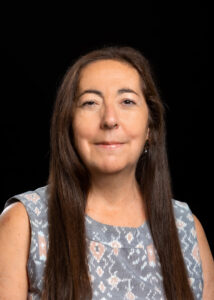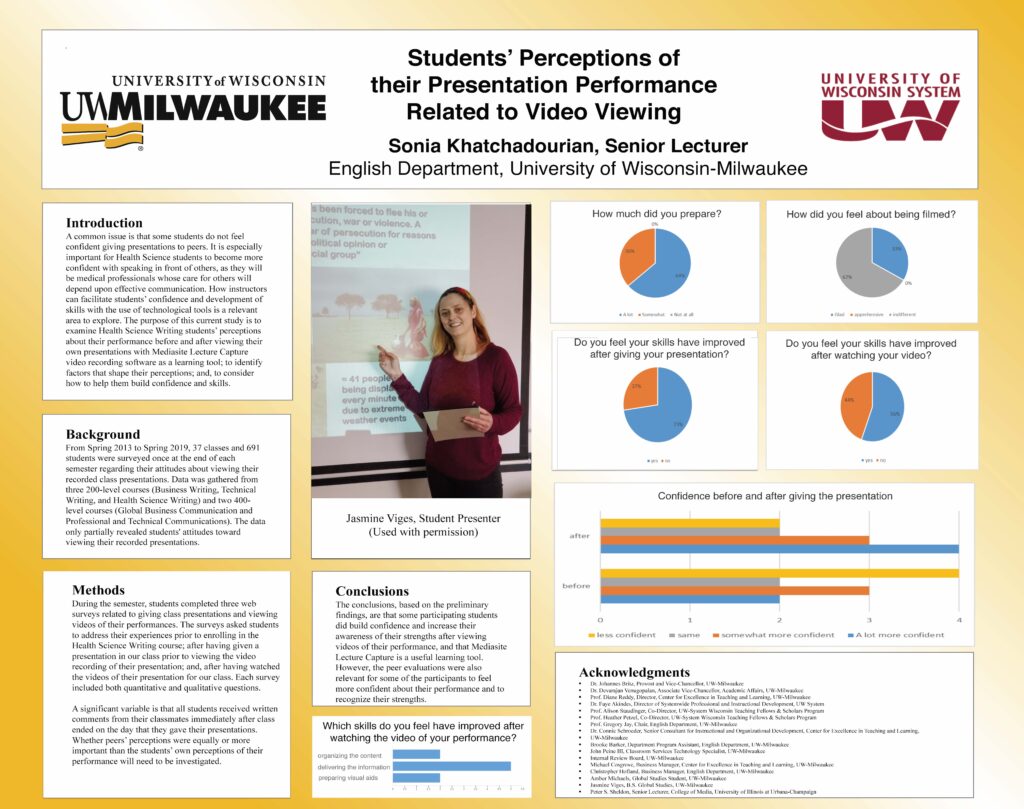UW-Milwaukee
Senior Teaching Faculty, English
Wisconsin Teaching Scholar, 2019-20
At the time of this writing, it has been more than five years since I participated in the Wisconsin Teaching Fellows & Scholars (WTFS) Program as the scholar for the University of Wisconsin-Milwaukee (UWM) during the 2019-20 academic year. I was part of what could be called the first pandemic cohort. I participated in person at the Faculty College in Madison and at the Summer Institute in Richland Center. However, one month before I was to return to Madison for the OPID Spring Conference for a poster presentation to display and discuss my research and findings for my study, all in-person educational activities, including conferences and classroom teaching, had shifted to online communication channels. The change happened suddenly, and I learned that we could not return to campus until further notice, which turned out to be months later. I wanted to make a video to discuss my project using the same platform, Lecture Capture, that was included in my study. I was able to do so with the help of Jay Peine, a Technology Specialist in the UWM Classroom Support Office. I had only two hours to record the video on the final day when instructors were permitted to be on campus. We were required to evacuate campus only minutes after I finished making the video. When I left the building, the doors were locked behind me.
In addition to Jay, there are many others who helped me while I was involved in the WTFS Program. I was grateful to the Director of Systemwide Professional and Instructional Development, Fay Akindes, for her wisdom and thoughtfulness throughout the entire year and beyond. Her gentle demeanor and support helped to reduce any concerns I felt about being in a cohort of mostly scientists. I am also grateful for the enthusiasm and attentive guidance of co-directors Alison Staudinger and Heather Petzel, as well as all my colleagues in the cohort and at my campus who helped me with my research project. I must also acknowledge Brooke Barker, the English Department’s Administrative Assistant, who aided me to follow important guidelines related to using current students in a study. Brooke distributed questionnaires and collected data to share with me anonymously. She also made suggestions on how I could refine my questions. Brooke passed not long after my time in the WTFS program ended. I am also grateful to my university’s staff at the Center for Excellence in Teaching and Learning, with whom I took almost every professional development workshop that was offered for many years, and especially to Amy Mangrich, who encouraged me to apply for the WTFS program and believed in my ability to be involved in a rigorous program while I already had a heavy workload. The call for proposals emphasized that the WTFS program would be an opportunity for participants to reflect on their teaching and students’ learning, which also convinced me to apply, and I am tremendously glad that I did, as the experience enriched my professional life. As the proposal stated, “The demands of teaching necessitate a clearing.”
Reflecting now on what I learned and how it affected how I engage with students in their learning processes, one of the most important consequences was that I could more effectively discuss with students in my professional writing courses who are majoring in science-related fields, the various considerations for how to effectively devise and conduct a study that includes qualitative and quantitative data, as they are required to read and write about studies in their own writing. More importantly, I have discovered new ways of helping students to learn about how they learn to become better learners. Specifically, I have developed greater empathy and understanding about the emotional challenges that they face when having to speak in front of a class, which has affected my guidance for their oral presentation assignment.
There were many meaningful impacts on my teaching from my participation in the WTFS program and in my engagement with the Scholarship of Teaching and Learning (SoTL). Although I had previously attended symposia offered by the UW-Milwaukee Center for Excellence in Teaching and Learning (CETL) and the Spring conferences offered by the UW-System Office of Instructional and Professional Development (OPID), this opportunity was my first experience to collaborate extensively over time with a cohort of instructors in a variety of disciplines within our university system. Many of my colleagues in the cohort were in scientific fields. Learning about their research within their disciplines and receiving their input on my research project during our time together at the Faculty College in Madison and the Summer Institute in Richland Center, as well as completing the required IRB courses, helped me to gain a deeper understanding of how I could design my study in a way that would yield valid data. I also learned how to apply what I learned to modify assignments and discussions for my courses that are related to science-based writing.
Many of the courses that I teach include a required oral presentation component. Regardless of the type or level of the course, this assignment is what causes the greatest concern for students. I already knew how to instruct them on effective strategies for organizing and delivering the content, preparing visual aids, and interacting with their audience. However, I needed to further explore how to increase their confidence speaking in front of others, as feeling comfortable doing so is an important step in achieving success in their professions, and confidence is at the core of what all of us are willing to try to actualize our potential and pursue our goals. My research project was titled, “Students’ Perceptions of their Presentation Performance Related to Video Viewing.” I had recorded class presentations prior to my study and would request students to complete surveys based on viewing their presentations. However, I wanted to discover if students’ confidence increased after they gave their presentations and watched their videos and, if so, how and why. I modified how I collected and interpreted data based on what I learned about conducting a study that involves human subjects. Some of my students still become anxious about giving presentations, regardless of the guidance and support that they receive, and I am still exploring how to positively affect their perspective of the activity before and after they complete it because of its significance beyond the classroom to them and me.
In addition, and most importantly (as mentioned earlier), learning about and reflecting intensely on how students learn throughout the year is the most enduring and meaningful impact of participating in the WTFS Program. Every assignment I design, every lecture I prepare, every class activity I design is accompanied by considerations of the learning outcomes for students.
Although my cohort was not able to give our poster presentations in person at the Spring 2020 OPID conference due to the COVID-19 pandemic, I was grateful for the opportunity to participate with some of them in a panel discussion about our projects and experiences with a subsequent cohort. The video presentation of my project poster is available here, and the poster is available here ( POSTER and FACT SHEET)
Biography:
My teaching career at the university-level began in 1984 when I was a graduate teaching assistant at the University of Hawaii-Manoa. Since then, I have primarily taught in the English Department at the University of Wisconsin-Milwaukee (UWM), but also for the Global Studies Program. I represented UWM as a guest lecturer for two years at Justus Liebig Universität in Giessen, Germany, and taught for a semester at the Institut Teknologi Mara in Shah Alam, Malaysia for Indiana University as part of the Midwest Consortium for International Activities in which UWM participated. I also taught at Marquette University and the Milwaukee Institute of Art and Design. I was a tutor in the Writing Center at the University of Hawaii-Manoa and the Learning Center at Chaminade University of Honolulu, as well as a writing coach for an MBA cohort at UWM. During my teaching career, I have offered 37 different courses, 15 of which I have created. In addition, I offered 15 non-credit community enrichment courses through the UWM School of Continuing Education that focused on different aspects of Blues music as cultural studies. I have also served the community as a volunteer for WMSE, the radio station of the Milwaukee School of Engineering, and have conducted more than 450 interviews with musicians, authors, actors, and others. Upon request, I gave four talks to the community about the creative work of musicians. Many of my previous publications are related to Blues music and include four feature articles in Living Blues magazine, published by the University of Mississippi Center for Southern Culture, a chapter on the history of Blues music in Milwaukee in the book, Milwaukee Rock and Roll, 1950-2000: A Reflective History (Marquette University Press, 2019), 23 feature articles in other publications based on interviews, and numerous other articles related to Blues music. I edited three articles and one book for publication. Currently, I teach in both the Professional Writing Program and the Creative Writing Program at UWM, and I do administrative work as the Associate Coordinator of Creative Writing. Over the years, I have participated in many Professional Development activities and have earned multiple certificates from the UWM Center for Excellence in Teaching and Learning. My most recent conference presentation, “Strategies to Adapt Technical Information for a Non-Technical Audience,” was for the online Inaugural Conference on Teaching Writing in the Health Professions, sponsored by Arizona State University. My current memberships in professional organizations are the Association of Business Communication, the Associated Writing Programs, and Phi Beta Kappa.
SoTL Presentations:
“Strategies to Adapt Technical Information for a Non-Technical Audience: The Fact Sheet,” Teaching Writing in the Health Professions (online conference), Arizona State University, June 2022. POSTER
